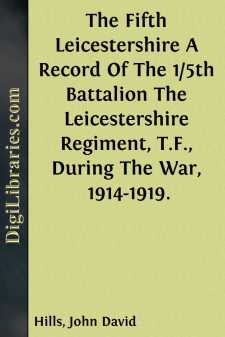Categories
- Antiques & Collectibles 13
- Architecture 36
- Art 48
- Bibles 22
- Biography & Autobiography 813
- Body, Mind & Spirit 142
- Business & Economics 28
- Children's Books 17
- Children's Fiction 14
- Computers 4
- Cooking 94
- Crafts & Hobbies 4
- Drama 346
- Education 46
- Family & Relationships 57
- Fiction 11829
- Games 19
- Gardening 17
- Health & Fitness 34
- History 1377
- House & Home 1
- Humor 147
- Juvenile Fiction 1873
- Juvenile Nonfiction 202
- Language Arts & Disciplines 88
- Law 16
- Literary Collections 686
- Literary Criticism 179
- Mathematics 13
- Medical 41
- Music 40
- Nature 179
- Non-Classifiable 1768
- Performing Arts 7
- Periodicals 1453
- Philosophy 64
- Photography 2
- Poetry 896
- Political Science 203
- Psychology 42
- Reference 154
- Religion 513
- Science 126
- Self-Help 84
- Social Science 81
- Sports & Recreation 34
- Study Aids 3
- Technology & Engineering 59
- Transportation 23
- Travel 463
- True Crime 29
The Fifth Leicestershire A Record Of The 1/5th Battalion The Leicestershire Regiment, T.F., During The War, 1914-1919.
by: John David Hills
Categories:
Description:
Excerpt
CHAPTER 1.
ENGLAND.
4th Aug., 1914.25th Feb., 1915.
The Territorial Force, founded in 1908, undoubtedly attracted many men who had not devoted themselves previously to military training, nevertheless it took its character and tone from men who had seen long service in the old Volunteer Force. Hence, those who created the Territorial Force did nothing more than re-organise, and build upon what already existed. In the 5th Leicestershire Regiment there crossed with us to France men who had over 30 years' service. At the outbreak of war in 1914, R.Q.M.S. Stimson could look back on 36 years of service, and, amongst other accomplishments he spoke French fluently. Other names that occur to us are Serjt. Heafield, with 28 years, and C.S.M. Hill with 16 years, both of Ashby, and both of whom served in the Volunteer Company in South Africa. R.S.M. Lovett (27 years), of Loughborough, also wears the South African medal for service in the same Company. Then there are Pioneer-Serjt. Clay (27 years' service), C.S.M. Garratt, of Ashby, C.S.M. Wade, of Melton, R.Q.M.S. Gorse, of Loughborough, Signal-Serjeant Diggle, of Hinckley—all long service men. The senior N.C.O. in Rutland was C.S.M. Kernick, who had done 18 years' service when war was declared.
The infantry of the 46th (North Midland) Division consisted of the Nottinghamshire and Derbyshire, the Lincolnshire and Leicestershire, and the Staffordshire Brigades. Our brigade, the 138th, was commanded at first by General A.W. Taylor, who was succeeded a few days before we left England by General W.R. Clifford. Staff officers changed frequently, and we hope we did not break the hearts of too many. Staff-Captain J.E. Viccars survived most of them, and we owe him much for the able and vigorous assistance he was always ready cheerfully to give us.
The 5th Leicestershire was a County Battalion, organised in eight companies, with headquarters respectively at Ashby-de-la-Zouch, Oakham, Melton Mowbray, Hinckley, Market Harborough, Mountsorrel, Shepshed, and one at Regimental Headquarters at Loughborough. The companies thus were much scattered, and it was only at the annual training camps that we met as a battalion.
The Territorial Force was better prepared for mobilisation than is generally supposed, and if the history of the assembly of the regiment at Loughborough in the first week, their train journey to Duffield in the second week, the purchase of horses, the collection of stores, the requisitions for food and the sharpening of bayonets, be demanded, it can be read in the orders printed many months before war even threatened. The orders were drawn up by Lt.-Colonel G. German, T.D., our former commanding officer, now D.S.O., and by his conscientious and indefatigable adjutant, Captain W.G. King Peirce, who was killed early in the war fighting with his old regiment, the Manchesters. It is due to these officers to record that every detail was studiously followed and found exactly correct. We heard of one officer who, at the time the printed book of orders was issued, was so fearful lest it should fall into the hands of some indiscreet or improper person, that he packed and sealed it, addressed it to his executors, and locked it up in a safe, so that even sudden death on his part would not force him to betray his trust....


